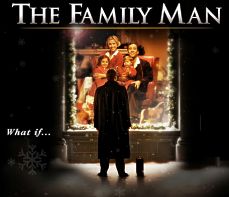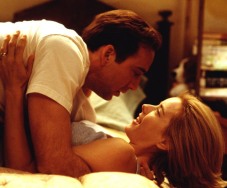| The Family Man |
| |
 |
USA, 2000. Rated PG-13. 125 minutes.
Cast:
Nicolas Cage, Téa Leoni, Don Cheadle, Jeremy Piven, Saul Rubinek, Josef
Sommer, Makenzie Vega, Jake Milkovich, Ryan Milkovich, Lisa Thornhill,
Harve Presnell, Mary Beth Hurt, Amber Valletta
Writers: David Diamond, David Weissman
Music: Danny Elfman
Cinematographer: Dante Spinotti
Producers: Marc Abraham, Tony Ludwig, Alan Riche, Howard Rosenman
Director: Brett Ratner
LINKS
|
 he
Family Man wants to be a heartwarming tale about the melting of a hardnosed
financier's heart. It wants to affirm that there are things more important than
money and career success. It wants to remind us to value the simple joys of
family life.
he
Family Man wants to be a heartwarming tale about the melting of a hardnosed
financier's heart. It wants to affirm that there are things more important than
money and career success. It wants to remind us to value the simple joys of
family life.
It isn't. It doesn't.
Karl Marx wrote, rightly or wrongly, that religion is the opiate of the masses.
One has to wonder what he would have said about movies like The Family Man.
Instead of being an enlightened meditation on what is Truly Important, The
Family Man teaches us not to envy the rich. Their lives aren't all that
great--didn't you know? They may have money and think they're content, but they're
not really happy. Not at all. One has to wonder how much longer Marie Antoinette
would have kept her head if the French nobility had had a movie industry to
propagate such silliness.
Worse, The Family Man tells us that reproducing and maintaining a stable
family unit are more important that pursuing our dreams. Just settle into a
small life without ambition... and that's it. Don't ask why. Don't seek more.
The meek shall inherit the earth.
These are some pretty reactionary ideas. One suspects that left-leaning Hollywood
didn't intend to purvey them. What Hollywood likely intended was a good-intentioned
cross between A Christmas Carol and It's A Wonderful Life. But,
as they say, the road to Hell is paved with good intentions.
The premise is this: Nicolas Cage is Jack Campbell, a shrewd, driven, Ferrari-accessorized
financier who spends his life alone. It's Christmas Eve, and his company is
on the verge of executing a half-a-billion-dollar merger. Except, the deal is
not quite in the bag, so Jack orders everyone to come to work on the Yule. On
his way home, he runs into a homeless man, Cash (Don Cheadle), to whom he foolishly
proclaims he has everything he needs. Turns out Cash is The Family Man's
version of Wonderful Life's Clarence, who now gives Jack a glimpse into
the life he might have led if he hadn't left his girlfriend, Kate Reynolds (Téa
Leoni), thirteen years earlier for a year-long brokerage internship in London.
 On
Christmas morning, Jack wakes up in Jersey with Kate sleeping next to him and
two young children bouncing off the walls. He drives a minivan; he has bad taste
in clothing and décor, and, horror of horrors, he works as a tire salesman for
Kate's father (Harve Presnell).
On
Christmas morning, Jack wakes up in Jersey with Kate sleeping next to him and
two young children bouncing off the walls. He drives a minivan; he has bad taste
in clothing and décor, and, horror of horrors, he works as a tire salesman for
Kate's father (Harve Presnell).
The snapshot of Jack's life as a high roller isn't a pretty picture, but neither
is his life that might have been. In his real life, he is greedy, insensitive,
and alone. But in his alternate life, his entire identity is subsumed into the
relationship. He isn't just expected to make his marriage and his children his
primary concerns…they are his only concerns. Kate repeatedly dissuades him from
following his dreams, instead of trying to find some middle ground where his
family and the pursuit of his dreams can co-exist.
Granted, Jack screws up in his alternate life when he applies for a job with
his old Wall Street employer and makes arrangements to move into the city without
consulting Kate. He screws up big time. But when he offers to commute from Jersey
so the family won't be displaced, Kate still won't hear of it--as if being a
good family man and pursuing his other dreams are mutually exclusive goals.
They are not. Kate is the one who makes them so, again and again. Ah, but you
see, there's nothing wrong with Kate's expectations, because the movie's implicit
assumption is that driving a Ferrari on Wall Street is a flawed goal, and that
you are a better person if you're a bowling league champion in Jersey. Maybe
so. But is it really so either/or? Not until the end of the film, when we are
treated to yet another one of those rushing-to-the-airport-to-catch-the-love-interest-in-the-nick-of-time
scenes, is there even a hint that there may be a third way.
The 2000 holiday season's other broad Hollywood attempt to appeal to the My
Best Friend's Wedding demographic, the pleasantly watchable What Women
Want, was an inoffensive attack on cartoonish male chauvinism. The Family
Man is insidious by comparison. The two male writers, who have apparently
been watching too much of The View, have imbued Jack with the qualities
pop psychologists like to associate with testosterone--drive, ambition, and
competitiveness. Then they systematically show how these qualities are antithetical
to a healthy relationship and family life. The Family Man pays lip service
to the sacrifices Kate has had to make for relationship and family, but we are
left to guess what they are. Instead, The Family Man seems to say that
if men would just grow up, what a better world it would be. It's no less sexist
than Porky's or Hardbodies 2. Is being competitive and ambitious
always immature? Can women not be competitive and ambitious themselves?
Giving up your dreams--and, really, everything that makes you who you are--for
the sake of the woman you love makes a nice fairy tale. But it's not a healthy
foundation for a relationship. Most women who want the kind of perfect women's-magazine
husband that Kate expects Jack to be are headed for disaster.
It's a relief that Cage and Leoni are appealing performers (Leoni's incongruous
performance in Deep Impact notwithstanding--she really should work more),
because otherwise The Family Man would be unrelentingly unwatchable.
The writers can't decide if Jack is Ebenezer Scrooge or George Bailey, and the
fact that Cage holds those two sides of Jack's personality together reasonably
well is a testament to his talent. Thematically, however, The Family Man
is a despicable film. Besides that, it's awfully difficult to swallow lectures
on the beauty of a modest existence from filmmakers who live in Beverly Hills,
Malibu, and Bel Air.
Review
© April 2001 by AboutFilm.Com and the author.
Images © 2000 Universal Studios. All rights reserved.

 On
Christmas morning, Jack wakes up in Jersey with Kate sleeping next to him and
two young children bouncing off the walls. He drives a minivan; he has bad taste
in clothing and décor, and, horror of horrors, he works as a tire salesman for
Kate's father (Harve Presnell).
On
Christmas morning, Jack wakes up in Jersey with Kate sleeping next to him and
two young children bouncing off the walls. He drives a minivan; he has bad taste
in clothing and décor, and, horror of horrors, he works as a tire salesman for
Kate's father (Harve Presnell).
